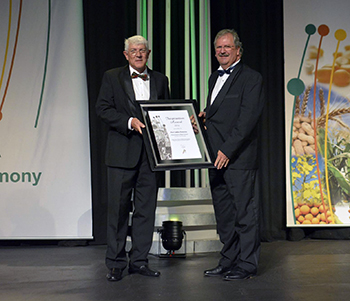Latest News Archive
Please select Category, Year, and then Month to display items
02 January 2025
|
Story Gerda-Marie van Rooyen
|
Photo Supplied
 Leading the research in South Africa is Prof Linus Franke from the Department of Soil, Crop and Climate Sciences.
Leading the research in South Africa is Prof Linus Franke from the Department of Soil, Crop and Climate Sciences.
Scientists are actively pursuing the successful breeding of diploid hybrid potatoes from inbred lines. This is expected to revolutionise potato breeding as it holds the key to rapid genetic progress. It will introduce new varieties for commercialisation through seed. Currently, existing potato variants have a gene that renders self-pollinated seeds infertile.
Prof Linus Franke, an academic in the Department of Soil, Crop and Climate Sciences at the UFS, is leading the research in South Africa. “This technology allows the production of genetically uniform potato seed that is easy to transport and largely disease-free.” He says this differs from conventional breeding whereby only vegetative propagation is possible due to tetraploid varieties in potatoes. It also risks carrying pests and diseases from one generation to the next – leading to the accumulation of pests and diseases with each round of multiplication.
Seed innovation
Prof Franke explains that Solynta BV, a seed company based in the Netherlands that produces potato varieties that can be grown from seed, has included South Africa in their research efforts because it is one of Africa’s largest producers and exporters. Through his academic relationship with Wageningen University and Research, a Dutch institution renowned for its agricultural endeavours and food production, the UFS became involved in researching hybrid potatoes grown from seed.
Diploid seeds containing two sets of chromosomes allow easier gene manipulation to increase predictability and speedier genetic progress. The breeding approach enables the incorporation of tolerance to pests, diseases, abiotic stresses (cold, heat, drought) and other desired genetic traits.
Although Prof Franke is optimistic about this research, he is not blind to disadvantages. “Potato seeds are tiny and have little energy reserves, making it harder to grow potatoes from seed than from tubers.” He says potatoes from seed will take longer to cultivate than tubers, as farmers need to grow plantlets from seeds first, adding six weeks to the growing period. “It is possible that commercial farmers can grow potatoes directly from seed. Alternatively, perhaps more likely, specialised growers will produce tubers of potatoes from seed; these tubers are then sold as seed tubers to other potato farmers, who then continue their normal practices of producing potatoes for the market from tubers.”
Financial benefits
Prof Franke says farmers have reason to get excited. “Seed potatoes will reduce input costs, as varieties with enhanced tolerance to pests and diseases require less pesticides. Planting one hectare of potatoes requires three to four tonnes of potato tubers, but only one 25 g packet of potato seeds.” Since potatoes are a more valuable commodity than maize, this technology might also increase farmers’ income potential.
Plant researcher receives prestigious Grain SA award
2016-10-21

Prof Zakkie Pretorius from the UFS Department
of Plant Sciences with Andries Theron,
vice-chairman of Grain SA. Theron presented
the award to Prof Pretorius at Grain SA’s a
nnual gala event, which was held in Midrand
this year.
Photo (read more): Supplied
Photo (spotlight): Charl Devenish
A researcher in the Department of Plant Sciences at the University of the Free State (UFS), Prof Zakkie Pretorius, received the prestigious Grain Producer of the Year Inspiration Award during the annual gala event of Grain SA. Grain SA provides strategic commodity support and services to South African grain producers to assist in the sustainability of the sector.
This award is presented to individuals or organisations in appreciation of excellent contributions to the grain industry. These individuals have also achieved extraordinary results in their respective fields.
Research in the interest of food security
Prof Pretorius has been involved in research on plant diseases and food crops for the past 38 years. His research focus, rust diseases in crops, is especially important for food security.
According to Prof Pretorius, who collaborates with an extensive network of specialist colleagues, his research covers a variety of topics including rust race identification, the discovery of new resistance genes, characterisation of resistance expression in plants, and the mapping of genes. His focus is not only on wheat, but he also researches rust diseases in oats, barley, maize, dry beans, lentils, sunflowers, and soybeans.
Breeding of rust-resistant varieties gains scientific basis
Locally, he has been contracted for several years by the Winter Grain Trust to annually evaluate commercial wheat cultivars and elite germplasm. This information is regularly passed on to the relevant seed companies and breeders, and is also included in the production guidelines of the Agricultural Research Council for disease risk assessment. His research places the breeding and selection of rust-resistant varieties on a solid scientific foundation. A living collection of rust fungus cultures and a large germplasm collection are maintained at the UFS under his supervision.